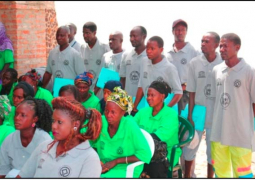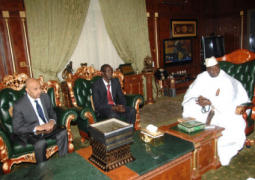Two hundred out-of-school youths from four different youth groups in Central River Region recently concluded a two-day capacity building training on malaria and behavioural changes communication.
The training, organised by the Nova Scotia Gambia Association (NSGA) and funded by Global Fund in partnership with Catholic Relief Services (CRS), took place at various venues in Bansang, Gampspadd, Methodist Lower Basic School and Banni village, all in Central River Region.
Speaking to participants at the Banni meeting,
The NSGA, for the past years, has been in schools across the country training and forming peer health groups on Hiv/Aids pandemic, for the peer health groups to spread the messages among the students and the communities in which they live.
"This project - Global fund project - is focusing purely on malaria and we are trying to pass the message about malaria and what is all about malaria? How malaria is contracted as well as its treatment and possible prevention methods," he said.
Mr Jarju called on participants to be ambassadors of the NSGA in spreading the gospel on malaria to the grassroots people in order to reduce malaria cases at that level.
For his part, Matt Decourcey, lead facilitator of the training, describes malaria as a life-threatening disease caused by plasmodium parasite that is spread by female anopheles mosquito in humans.
According to Mr Decourcey, malaria kills one million people each year of whom 90% are from
He said reports have revealed that every thirty seconds malaria kills a child in Africa, while at least one thousand children under the age of five die of malaria annually in The Gambia.
He noted that malaria signs and symptoms develop between 7 to 21 days after a bite by the female anopheles mosquito which carries the parasite.
He says there are two types of malaria: mild (uncomplicated) and severe (complicated) malaria. Some of their signs and symptoms include fever, headache, fatigue, vomiting, diarrhoea, coma, seizure, confusion, among others.
"It is through blood test that it can be confirmed that this particular patient is suffering from malaria, and the treatment prescribed by the health personnel must follow correctly," he said.
Yankuba Darboe, NSGA regional coordinator R6, stated that malaria disease has been in existence for years and even though people are being sensitised on the subject of malaria, it continues to claim lives of innocent children in the country. "The number of malaria cases is however reducing," he added.
He called on the participants to advocate for attitudinal change towards using preventive methods. "The most effective preventive malaria method is sleeping under a treated insecticide net," he said.
Mr Darboe commended Global Fund and CRS for their strategic support in the fight against malaria "to save the lives of innocent children and people".
Bakary Fatty, who spoke on behalf of the participants, said they would do their best to ensure "the message is spread to the grassroots level".




